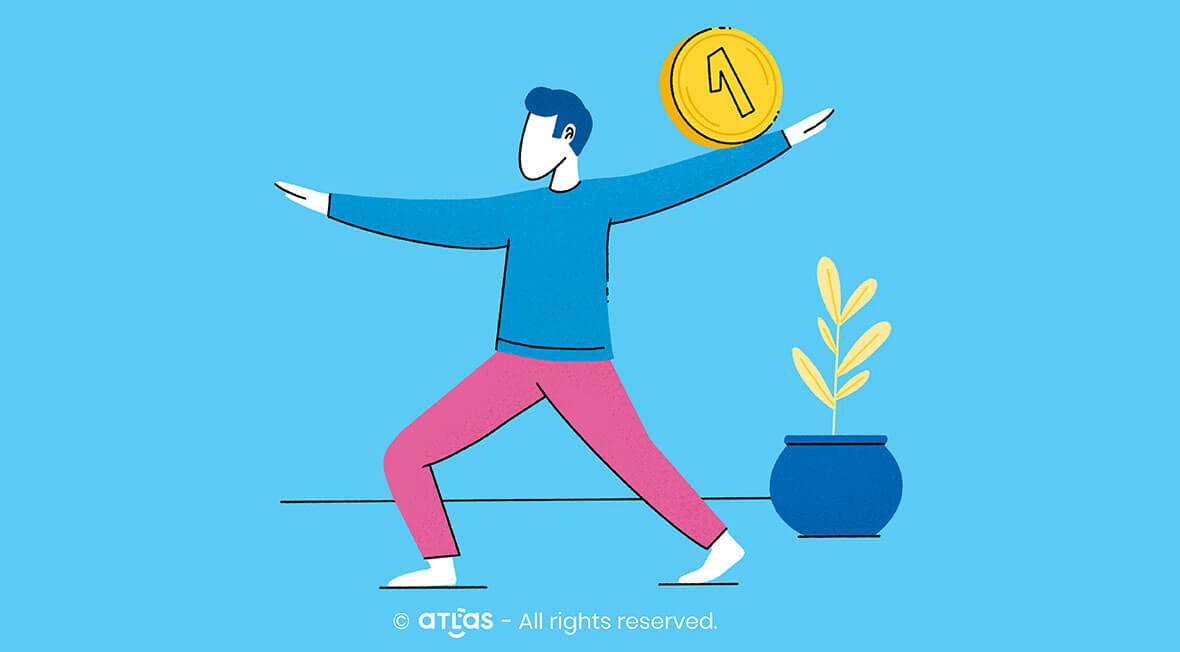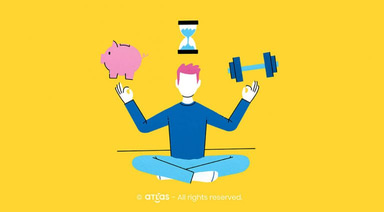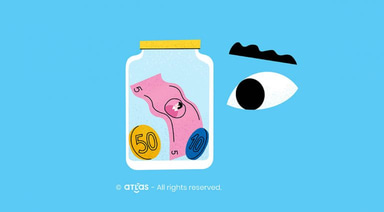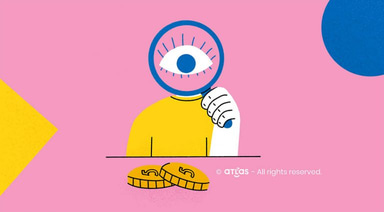Money doesn’t bring happiness, but it can bring financial freedom, and financial independence can lead to happiness. The most significant degree of freedom is offered by time, not money; time for family, for friends, to discover the world, time for your passions and time that you can use to help others. Mihai Constantinescu– ATLAS Specialist in Financial Education, gives us a lesson on how the correct use of money can bring us, in some way,our happiness ?
Money and happiness
Happiness is a state characterized by contentment and general satisfaction with your own life. Happiness can be lasting but continuously changing. In positive psychology, happiness is equivalent to the concept of Wellbeing – a high standard of living or well-being. Effective management of the money earned is also needed to maintain a high standard of living. In principle, money cannot buy happiness, but it can buy comfort, which in many situations, is as important as happiness. Having money doesn’t necessarily make you happier, but it increases your chances of being happy if you know how to use it.
Money is not directly linked to achieving sustainable happiness because, in principle, it is used to buy happiness-generating items in the short term.
The general concept of sustainable happiness is to strike a balance between satisfying the daily pleasures and managing the amounts of money available so that we have a satisfactory standard of living, but also the comfort that, within a reasonable time horizon, we can strive for financial freedom.
Important to remember is that money is a tool, and if used properly, they can buy freedom – the freedom to spend your time as you wish and the freedom to have total control over your life.
What does money mean, more specifically?
Using the money correctly means first and foremost generating sufficient revenue to cover essential expenses.
Secondly, the money earned should cover discretionary expenses – those things that we want but are not essential to our lives.
Third, which actually should be the most important part of the correct use of money, is the savings/investment area.
Money saved or invested is the only money that can bring us closer to financial freedom and closer to being in control of our time and life.
How can we start saving now?
- We start monitoring your daily expenses through an online app – for example, I use the Money Manager online app.
- We save at least 10% of our salary on payday, using the scheduled transfer option, automatically, from our current account to a savings account.
- After monitoring spending for at least a month, we are trying to divide spending by categories, see where we can eliminate waste, and the next step would be to limit, if possible, discretionary spending. To make this process more efficient, the 50/30/20 Budget Rule can help us.
How can Rule 50/30/20 help us to achive financial freedom?
Rule 50/30/20 divides monthly income into three categories:
- 50% of revenues are essential expenses (Needs – from the literature)
- 30% of revenues are discretionary expenses (Wants – in the literature)
- 20% of income represents saving/investment
At least theoretically, a maximum of 50 % of revenue should be essential expenditure like:
- rent / mortgage rate
- food
- utility payment
- transport
- health/medicines
- insurance
- rates other credits
30% of revenue should be a discretionary expenditure, i.e. expenditure that we want but which are not essential:
- holidays
- exits to restaurant / pub / club
- gym, subscriptions, Netflix, etc.
- tickets or subscriptions to different events
- different devices (a new phone, a new tablet, etc.)
20% of income should be saved/invested. Although we mention above that we need to save a minimum of 10% of your salary per month, The 50/30/20 Rule goes a little further and recommends keeping 20% of your salary for saving/investing.
The more money you manage to move from the essential spending and discretionary areas to the savings/investment area, the closer you are to financial freedom. It can bring you more quality time spent with family, friends, time spent doing the things you’re passionate about and, why not, things to help others or help your community.
Some ideas I’d like you to stick with:
- Money can’t buy happiness in the long run.
- Money doesn’t bring happiness, but it can buy things that make us happy, only in the short term.
- Money is a tool and, if used properly, can help achieve financial freedom.
- The most important aspect of financial freedom is better control of our time.
- Quality time spent doing the things we enjoy can bring us closer to happiness.
- In order to make the most efficient use of money, first of all we need to earn enough to cover essential, discretionary and save/invest.
- Rule 50/30/20 can help us monitor and streamline spending and direct more money to the savings/investment area.
- Essential expenditure should represent a maximum of 50% of monthly income.
- Discretionary expenditure should represent a maximum of 30% of monthly income.
- Money saved or invested should account for at least 20% of monthly income.
- Every amount saved brings us closer to financial freedom.
- Financial freedom brings us control of our time and life.
- Financial freedom can bring happiness.
If you want to learn concrete ways to save and how to invest efficiently to achieve financial freedom, ATLAS Specialists in Financial Education can help you. Schedule yourself right now for a financial coaching session.



